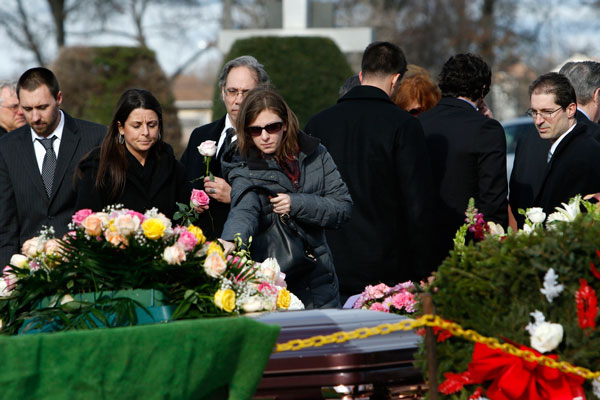
By Christina Gray
SAN FRANCISCO (CNS) – Sometimes when Catholic remains arrived at Holy Cross Cemetery in Colma, Calif., for burial without an accompanying member of clergy – or anyone at all – the cemetery’s longtime director would grab her own prayer book and offer the prayers of committal at the burial site.
“I brought the urn to the grave and said the committal prayers myself, along with one of our gravediggers,” said Monica Williams, who oversees all six San Francisco archdiocesan Catholic cemeteries. She was describing the recent burial of an indigent man with no family except a brother too ill to travel to the cemetery.
Increasingly Absent
Sadly, she said, remains arriving at the cemetery without family members, friends or clergy to attend the committal – the third and final part of the rite of Christian burial – have increased over the years. The rite includes the vigil, funeral and burial.
“I was heartbroken to think that were people being buried in our own cemeteries without the prayers of the church being said and without another Christian there as they were laid to rest,” said Laura Bertone, director of the San Francisco Archdiocese’s Office of Worship.
Williams had turned to Bertone in early 2015 to address the trend. Together they came up with a plan to ensure that no one would ever be buried without the witness of other Christians or completion of the full rite: a lay committal ministry.
Farewell Prayers
“The rite of Christian burial is so beautifully written by the church,” Bertone said. “The deceased passes with the farewell prayers of the community of believers into the welcoming company of those who need faith no longer but see God face to face,” she said.
Bertone and Williams both agreed that the problem presented a wonderful opportunity to laypeople to serve their fellow Christians. The church itself allows for laypeople to preside at the committal.
“The rites specifically say that in the absence of a parish minister, a friend or member of the family should lead those present in the rite of committal,” Bertone said.
In the spring of 2015, 28 deacons and laypeople from local parishes took part in a daylong training at Holy Cross Cemetery led by Mercy Sister Toni Lynn Gallagher, the ministry of consolation coordinator for the archdiocese, along with Bertone and Williams. The training prepares laypeople to officiate at burials when a group arrives without a member of clergy or when unaccompanied remains are delivered to the cemetery.
Cemetery traditions have been impacted by a number of different factors, Williams explained, including the difficulty some parish priests have fitting travel to and from the archdiocese’s cemeteries into their pastoral duties.
Many Possible Scenarios
But inactive Catholics separated from their faith communities and a general lack of understanding about Catholic burial rites are major factors, she said.
Sometimes families choose to conclude funeral services at a church or funeral home and do not or cannot come to the cemetery for burial. Other times the remains are shipped from out of the area where no local friends or family reside. And some people die without family or friends or parish communities and their remains are sent to the cemetery by local agencies.
There are many possible scenarios, said Williams.
“The deceased may have moved out of the area and no longer belong to a local parish but have a preselected spot at the cemetery,” she said. “They may have become alienated from the church for any number of reasons, but still want to be interred at the cemetery where their family is placed.”
At the committal ministry training, participants discussed what to say – and not say – to those in mourning. They also shared their own personal stories of grief and loss. Williams gave participants a tour of the cemetery and a lesson in its terminology and the day concluded with instruction on the actual rites, including the structure of the prayers and how to preside at a committal.
She said that church needs to do a better job of educating people about the richness of Catholic traditions and the values of its rites, and she hopes the new ministry can help in this way.
“A Christian burial can be a tremendous moment of evangelization, in some cases an introduction to our faith for visitors,” Williams said. “In other cases, it’s a reminder to those who have drifted away from the church of the ministry we offer and the great hope of our faith.”

thank you for sharing this important ministry with us. very touching.